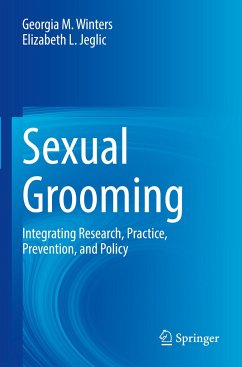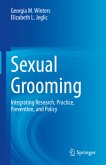This book provides an in-depth overview of the current research on sexual grooming. It explores the process by which an individual seeking to commit a sexual offense skillfully manipulates a potential victim into situations in which abuse can be more readily committed, while simultaneously preventing disclosure and detection. This volume addresses this understudied phenomenon and comprehensively examines what is currently known about the construct. It provides a thorough introduction to the sexual grooming literature, focusing on the history of the term and how sexual grooming strategies have become more publicly recognized through high-profile cases, as well as those in child-serving organizations (e.g., Catholic Church, Boy Scouts of America). The book reviews the various proposed models of sexual grooming - including the Sexual Grooming Model (SGM) - that detail the overarching steps or stages involved in the process. It discusses attempts to define the construct of sexualgrooming and addresses potential consequences of sexual grooming, emphasizing how victims, families, and communities at large may be affected.
Key areas of coverage include:
Unique contexts and facets in which sexual grooming behavior has been observed, including online grooming, personal/self-grooming, familial grooming, institutional grooming, and grooming behaviors of females. The ways in which sexual grooming strategies may be manifested in sex trafficking cases and in adult sexual abuse. Assessment and treatment of sexual grooming, as well as prevention strategies. The implementation of grooming research to inform law enforcement efforts and court decision-making. The creation and adoption of legislation and policies designed to prevent sexual grooming.
Child Sexual Grooming is an essential resource for researchers, professors, graduate students, clinicians, mental health therapists, legal professionals, policy makers, law enforcement, and related professionals in developmental psychology, child and adolescent psychology, social work, public health, criminology/criminal justice, forensic psychology, and behavioral therapy and rehabilitation.
Key areas of coverage include:
Unique contexts and facets in which sexual grooming behavior has been observed, including online grooming, personal/self-grooming, familial grooming, institutional grooming, and grooming behaviors of females. The ways in which sexual grooming strategies may be manifested in sex trafficking cases and in adult sexual abuse. Assessment and treatment of sexual grooming, as well as prevention strategies. The implementation of grooming research to inform law enforcement efforts and court decision-making. The creation and adoption of legislation and policies designed to prevent sexual grooming.
Child Sexual Grooming is an essential resource for researchers, professors, graduate students, clinicians, mental health therapists, legal professionals, policy makers, law enforcement, and related professionals in developmental psychology, child and adolescent psychology, social work, public health, criminology/criminal justice, forensic psychology, and behavioral therapy and rehabilitation.








